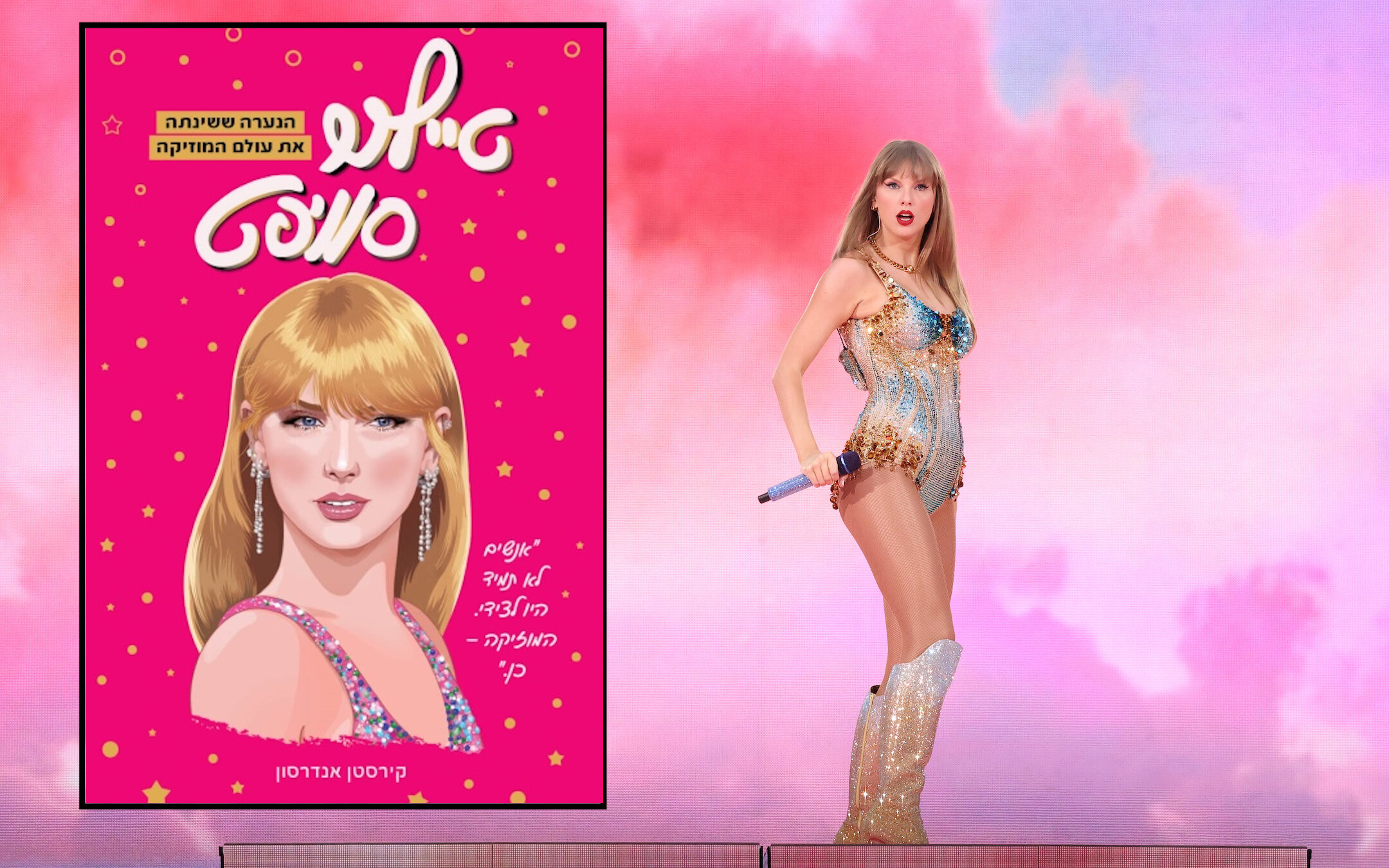Bestseller ‘Who is Taylor Swift?’ comes out with its first international edition — in Israel
Some of Swift’s fans are frustrated she hasn’t spoken out on the Israel-Hamas war. Israelis are relieved

The Hebrew language “Who is Taylor Swift” book was released June 5, 2024; Taylor Swift performs at Groupama Stadium on June 2, 2024 in Lyon, France. (John Shearer/TAS24/Getty Images for TAS Rights Management)
Taylor Swift’s detachment from contentious global conflicts is a hallmark of her superstardom. For some fans in Israel, it’s also a selling point.
Michal Paz-Klapp, the Young Adult editor at Israel’s prominent Modan Publishing House, snatched the opportunity to publish a Hebrew-language edition of “Who Is Taylor Swift?,” by Kirsten Anderson. The U.S. children’s book came out in April as part of Penguin Workshop’s bestselling “Who Was?” and “Who Is?” series, a range of illustrated biographies chronicling public figures from Ruth Bader Ginsburg to Confucius.
The Hebrew version of “Who Is Taylor Swift?” hit Israeli bookstores last week, making it the book’s first international edition.
While Swift’s popularity knows no borders, one non-musical choice has recently added to her appeal in Israel, said Paz-Klapp — her abstention from speaking about the Israel-Hamas war. Her Israeli listeners are well-aware of their growing isolation on the world stage as public opinion turns against Israel’s eight-month war, which has ravaged Gaza with a humanitarian crisis and a death toll over 37,000. Simply saying nothing about it has won Swift points with Israeli fans, many of whom view her music as an escape from the trauma of the Oct. 7 Hamas attacks that launched the war and the surging global censure of Israel.
“Part of the love that Taylor is receiving is that she’s — I don’t know if she supports Israel, actively — but she is not against Israel, and this is really important for the Israeli crowd, I think,” Paz-Klapp told the Jewish Telegraphic Agency.
Other fans around the world have denounced the pop star’s silence. Thousands flooded X with the hashtag #SwiftiesForPalestine in May, demanding she take a stand after Israel struck the southern Gaza city of Rafah and set a refugee camp aflame. Some fans have attended her worldwide Eras Tour with Palestinian flags and signs reading “Speak Now,” a reference to her 2010 hit album.

Protesters hold a sign that reads ‘zionism is terrorism the erase tour’ in the style of Taylor Swift’s Eras Tour signs during the Save Rafah Now and Free Julian Assange Rally on February 18, 2024 in Melbourne, Australia, the third date of Swift’s tour stop there. (Alexi Rosenfeld/Getty Images)
Swift was also among hundreds of celebrities targeted by a social media campaign called “Blockout 2024,” aimed at blocking artists and influencers who have not made public statements in support of Gaza. Selena Gomez, Drake, Justin Bieber, Zendaya and the Kardashian family were other household names on the “digital guillotine” lists.
Although Swift tiptoed around any political issues for years — making news when she went so far as to call herself a feminist after nearly a decade of fame — she has more recently harnessed her platform in the sphere of U.S. politics. Since coming out as a Democrat and endorsing President Joe Biden in 2020, she has condemned the Supreme Court’s overturning of Roe V. Wade as well as anti-LGBTQ legislation. Last year, a message on her Instagram story encouraging her followers to vote prompted a surge of more than 35,000 registrations on Vote.org.
But while abortion rights and matters concerning the LGBTQ community may divide the U.S. electorate, they are less contentious within Swift’s fan base, which skews toward Democratic, millennial and Gen Z white women. The Israel-Hamas war is a more divisive issue among young liberal-leaning voters.
Swift’s avoidance of the subject has allowed Israelis to assign their own meanings to her music. “Bigger Than the Whole Sky,” a song from Swift’s 2022 “Midnights” album about saying goodbye to someone, has become an anthem for friends of Roni Eshel, a 19-year-old Israeli soldier and fan of Swift who was killed by Hamas on Oct. 7. Eshel’s friends petitioned Swift to intervene on her behalf last fall, before Eshel’s death was confirmed.
“When Swifties go to shows, they make bracelets and give them to other fans from all over the world,” said Paz-Klapp. “So in Israel, they prepared Roni Eshel bracelets and they have given them to other fans.”
Swift has not performed in Israel — its small size and geographic isolation mean relatively few top acts make it a stop on their tours. But Israeli fans have been flying to Europe for her shows there, with a Facebook group just for ticket resales and travel coordination drawing nearly 4,000 participants.
Shira Ben-Choreen Schneck is a bookkeeper at The Deborah Harris Agency, the Jerusalem-based literary agency that secured the deal to publish “Who Is Taylor Swift?” at Modan Publishing House. She urged the agency’s foreign rights director to accept the book, sharing her own family’s affinity for Swift. Her three daughters — aged 14, 12 and 9 — are all fans.
Schneck lives in Armon Hanatziv, also known as East Talpiot, a Jerusalem neighborhood located on land Israel captured in the 1967 Six Day War and annexed. Israel views the entire city as part of its sovereign territory, though Palestinians claim East Jerusalem as their capital.
According to Schneck, her family enjoyed a sense of camaraderie with their Arab neighbors before Oct. 7. Then tensions rose in the neighborhood. Her children have had rocks thrown at them and a car following them on the street. Schneck’s 12-year-old daughter was particularly affected — and found refuge in Swift’s 20-year discography.
“She basically wouldn’t really leave the house, up until February,” Schneck told JTA. “She insisted on being picked up, she wouldn’t take buses, she just was so shaken by everything that happened. She ended up doing art therapy for it. But for all my kids, it was just kind of great to have a place to escape, and I feel [Swift’s] music definitely contributed to that.”
Schneck’s children already have both the English and Hebrew editions of “Who Is Taylor Swift?” at home. Her 12-year-old approved the book in a message to JTA, although her knowledge of the pop star outpaced its material.
“The Taylor Swift book was very interesting,” she said. “It had a lot of facts about her. As a Swiftie, I knew most of them.”
This article originally appeared on JTA.org.














